montreal's
2012 NUITS D'AFRIQUE MUSIC FESTIVAL
photography: CHANTAL LEVESQUE
____________________________________________
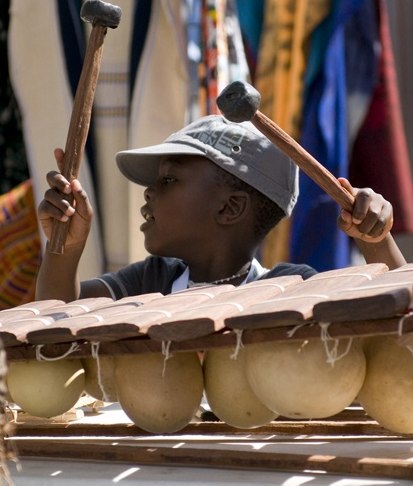
It
was only fitting that for the 26th edition of the 2012 Festival
International Nuits d’Afrique a significant
number of the 90-plus concerts (spread over seven venues) were
provided by composers, singers and musicians from the Maghreb
(Tunisia, Algeria, Morocco), countries whose southern borders
are buried and blistered in sand.
If
the Arab Spring has thus far not lived up to the hopes and expectations
of its many revolutions that were inspired by western concepts
of government by consent and equal participation for women,
one only has to tune into its new music for examples of how
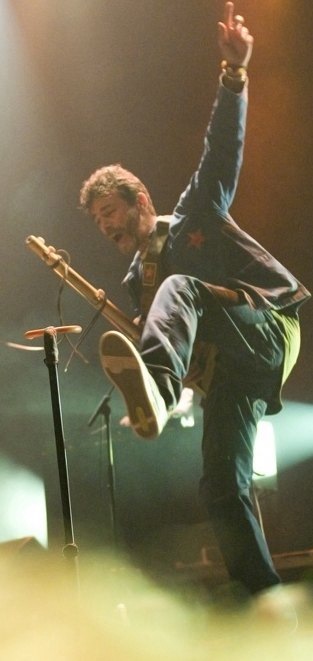 tradition
can be made to successfully accommodate modernity. Embracing
rock, Latino, reggae and hip-hop, Arabic fusion represents a
synthesis of near East and West that the political can only
hope to emulate.
tradition
can be made to successfully accommodate modernity. Embracing
rock, Latino, reggae and hip-hop, Arabic fusion represents a
synthesis of near East and West that the political can only
hope to emulate.
In
Africa, there are two distinct musical responses to poverty
and despair. The North African goes directly into the heart
of it and emerges with a sad and heart wrenching music that
is predominantly minor key, while in the rest of Africa, the
music is transcendental, in the major keys, offering happy,
alternative worlds to the harsh realities on the ground. So
when we talk about Arabic fusion we are talking about minor
key music that is opening up its borders to major key influences
– which is revolutionary.
An
endearing illustration of this was delivered by Tunisia’s
impassioned, politically engaged, Emel Mathlouthi, whose plaintive
voice and lyrics echoed the influence of Om Kalsoum as well
as the contrapuntal rhythms and inflections from elsewhere in
Africa and the West. If there is one constant that runs through
the music of Mathlouthi to Syncop to Hamid Bouchnak, it’s
the energy and hopefulness that lie at the heart of the modern
idiom.
*
* * * * * * * * * * * * * * * * * * * * * * * * * *
Nuit
d’Afrique’s unique place among world music festivals
is due to its dynamic programming duo of Frédéric
Kervadec et Hélène Dimanche: the latter looks
after the national, the former the international, and they refuse
to play it safe. They will not program music that is RC (Reggae
Correct), or in thrall to the tyranny of roots: music that dares
not offend the reigning reggae gods for whom a first- world
chord change or straight rock beat is anathema.
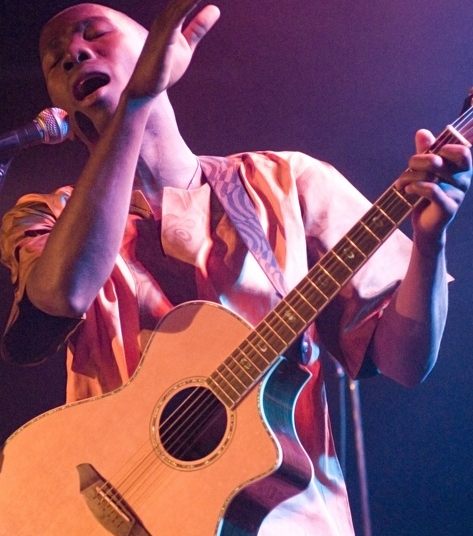
Among
the many discoveries at this year’s festival was Bélo,
from Port-au-Prince (Haiti). He refused to be confined by the
hard and fast rules of reggae, which resulted in a highly personalized,
vital music that offered an evening’s worth of original
twists and turns that kept the capacity crowd at Le Cabaret
du Mile End in a state of eager anticipation.
The
following night at Club
Balattou we were treated to the very special
playlist of Ghana-born, Toronto baked Kae Sun. Before the set
began, he spoke nostalgically about his homeland, but his music
did not appeal to “the village” or ethnicity. Instead,
his used the situations of his everyday life as material for
songwriting that easily won over the capacity crowd. What stood
out in both sets was the absence of overlap and redundancy in
the instrumentation: the music lines (guitar, bass) were exquisitely
clean, which translated into a limpidity that was a festival
highlight. Even though it cannot stand alone, silence is the
most important note in the scale and not enough musicians give
it its due. Kae Sun is a national secret about to get some big
time exposure, and it will likely come from song, not yet released,
entitled “Ship
and the Globe.” Stay tuned.
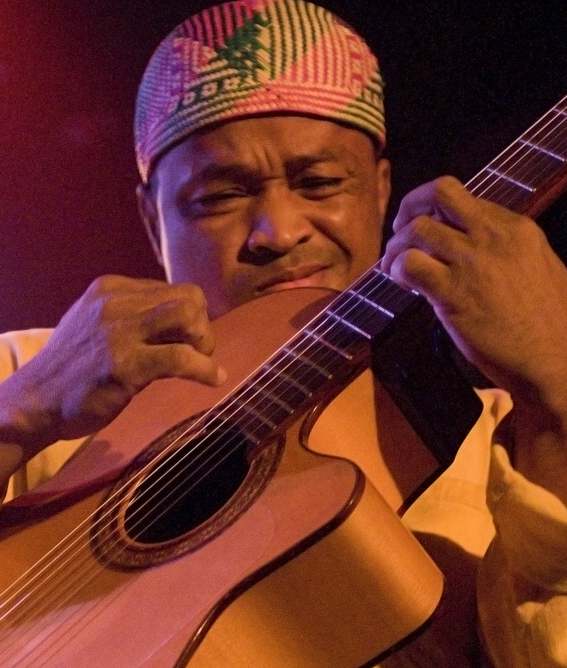
“Brilliant’
is the only word that can describe the guitar work of the amazing
Charles
Kely from Madagascar. His finger work rivaled
that of the great flamenco players while his melody lines and
feeling revealed what is enduring in African music. Nuit d’Afrique
has launched many a career and I can’t think of anyone
more deserving of a boost than Kely, the perfect synthesis of
Africa and jazz.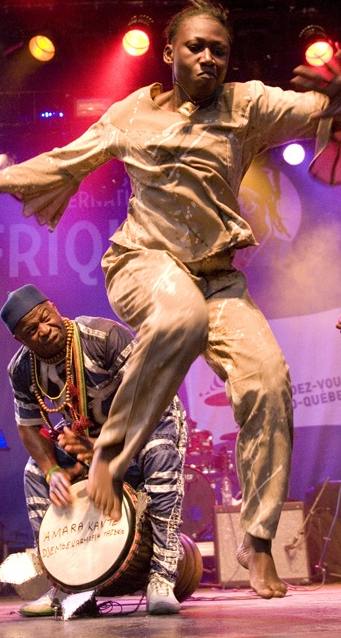
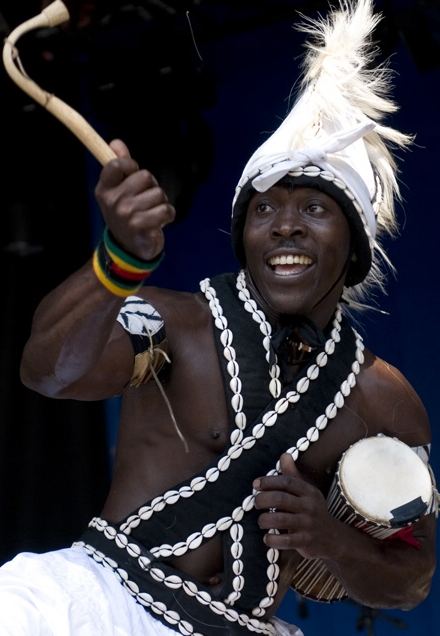
Despite
the massive indoor programming, the spirit of the festival comes
into its own when the scene shifts downtown to the Quartier
des Spectacles for four days of free outdoor concerts that begin
early in the afternoon finishing round the midnight hour. Among
this year’s notables were: Les Frères Guisse from
Senegal whose mellow acoustic guitars and soothing harmonies
offered peace to the restive mind; and from RD Congo, the inimitable
Diblo Dibala, one of Africa’s premier guitarists. Without
ever betraying the feel of Africa, he torques his guitar and
amp in such a way that despite the almost Hendrix-like distortion,
the notes flow deliciously into each other like liquid gel:
his is a unique, ingratiating sound you won’t hear anywhere
else.
Since
music is always evolving and borders are always moving and morphing,
Nuit d’Afrique dedicates itself to being there for creative
artists who, without distinction, are willing to follow the
dictates of the heart and the culture and politics on the ground
that move the heart, guaranteeing a music that speaks in an
authentic voice and whose vibe invariably sheds light on the
world as it turns -- for better or worse. “Dem belly full.”
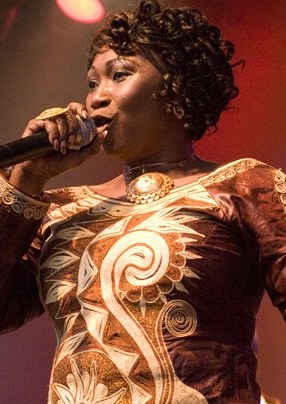
In
case you missed it, Nuit d’Afrique’s programming
is now a going concern (in Montreal) the entire year. Every
Thursday it hosts Rythmes
au Féminin, featuring women in music.
In early 2013, festival Syli
d'Or de la musique du monde will celebrate
world music, and later on in the year, there will be a special
Nuit event emphasizing the evolution and development of the
wide array of string instruments, many of which are indigenous
to Africa: the bandjo, the guembri, the kora and the oud.
So
until then, catch a falling star and put it in your iPod and
remember that the music you love will never let you down.
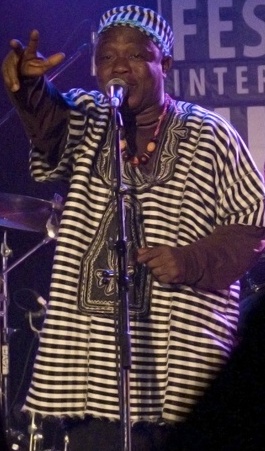
Photos
© Chantal
Levesque
Report filed by Robert J. Lewis
2011
Nuit d'Afrique
2010 Nuit d'Afrique
2009 Nuit d'Afrique
2008 Nuit d'Afrique